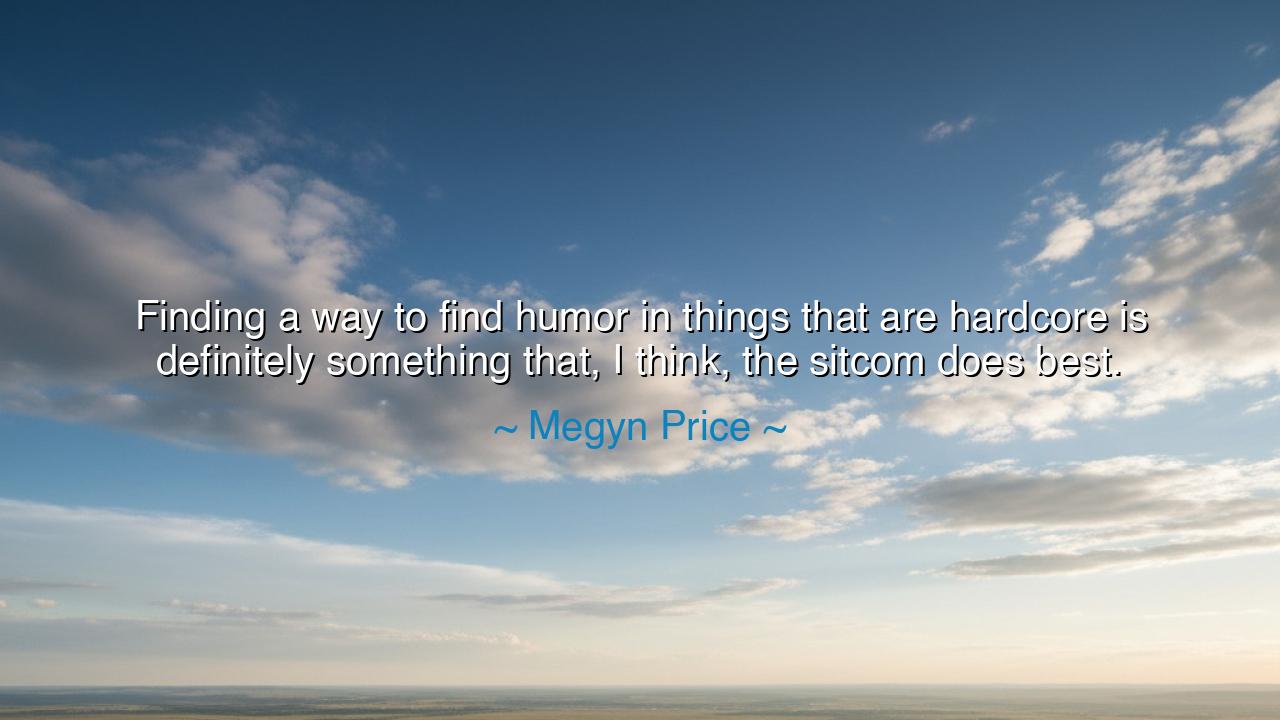
Finding a way to find humor in things that are hardcore is
Finding a way to find humor in things that are hardcore is definitely something that, I think, the sitcom does best.






The words of Megyn Price speak to a timeless wisdom hidden beneath the art of laughter: “Finding a way to find humor in things that are hardcore is definitely something that, I think, the sitcom does best.” Though spoken of television, her reflection reaches far beyond the screen — into the ancient heart of storytelling itself. What she describes is not merely entertainment, but the sacred human instinct to transform pain into laughter, to alchemize the weight of reality into something light enough to carry. For in the act of finding humor within hardship, we find not escape, but strength, not denial, but healing.
From the beginning of civilization, humor has been the soul’s response to adversity. The ancients understood that when life becomes hardcore — when it tests the body, mind, or spirit — laughter becomes both shield and salve. It is no coincidence that the first plays performed in the amphitheaters of Greece were comedies, often born from the same soil that produced tragedy. The people gathered not only to mourn with the tragedians but to laugh with the comedians — for laughter restores balance. Where tragedy breaks the heart open, comedy fills it again. Megyn Price, in her wisdom, recognizes that the modern sitcom continues this sacred cycle: it takes the raw material of everyday struggle and shapes it into something that renews us.
To find humor in the hardcore is not an act of ignorance; it is an act of courage. It is easy to laugh when life is kind, but to laugh amid chaos — that is divine. The ancient Stoics taught that the highest virtue lies in accepting what cannot be changed and facing it with serenity. Humor, too, is an acceptance — a quiet acknowledgment that pain is real, but not final. The sitcom, with its blend of laughter and vulnerability, becomes a reflection of this truth. It tells us that no matter how severe the conflict, there is still room for grace, for irony, for joy.
Consider the story of Lucille Ball, the queen of early sitcoms. Behind her laughter stood a woman who battled doubt, failure, and heartache. Yet, through her show I Love Lucy, she transformed her own imperfections into universal joy. When Lucy stumbled, the world laughed — not in mockery, but in recognition. Her humor emerged from the hardcore realities of life — the struggle to belong, to balance ambition and love, to confront chaos with charm. Like the jesters and poets of old, she turned her trials into light, reminding us that to laugh at the human condition is to rise above it.
The sitcom, as Megyn Price observes, carries this torch into the modern age. It teaches through laughter what philosophy teaches through reason: that hardship is bearable when met with humor. Each episode, with its misunderstandings, heartbreaks, and reconciliations, mirrors the cycle of human life. The laughter we share at the end is not empty — it is catharsis. We laugh because the characters survive, because the world keeps spinning, because in their absurdity we see our own endurance.
The lesson here is profound: seek humor, especially in hardship. When life becomes intense — when grief or failure threaten to darken the spirit — look for the spark of laughter hidden within it. This is not to mock suffering, but to claim victory over it. Laughter is a declaration that the heart remains unbroken, that even in difficulty, there is beauty worth beholding. Just as a sitcom turns conflict into comedy, so too can you turn pain into perspective. The practice is simple: when faced with the hardcore, pause, breathe, and ask yourself — “What is absurd about this? What part of this will one day make me smile?”
And so, dear listener, let Megyn Price’s words be your guide: find the humor that lives inside hardship. Whether through storytelling, companionship, or quiet reflection, use laughter as your torch through the darkness. For to laugh amid trial is not weakness — it is mastery. It is to stand in the storm and say, “I am still here, and I still find joy.” The sitcom does this for us, but we can do it for ourselves. Remember always: humor is the breath of resilience, and laughter is the language of the soul’s survival.
Thus, pass this wisdom forward. When the world grows hardcore, and your burdens seem too heavy, light them with laughter. For in that sacred sound, you will find both freedom and faith — the enduring belief that even in life’s fiercest moments, joy can still be found, and shared.






AAdministratorAdministrator
Welcome, honored guests. Please leave a comment, we will respond soon